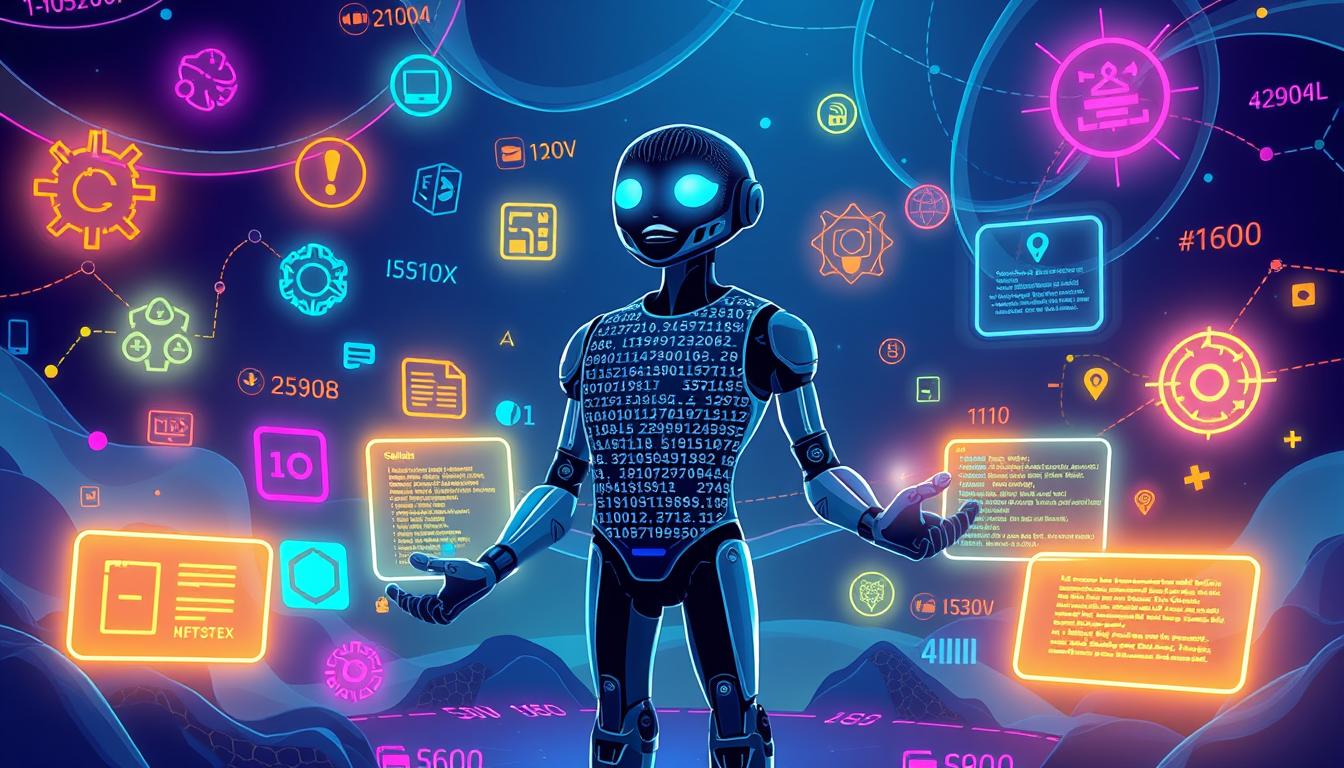Best Programming Language AI
Are you ready to start your AI journey but don’t know which language to use? The AI world is changing fast. Choosing the right tool is key to your project’s success. Python is versatile, while Julia is fast, each with its own strengths for AI.
We’ll explore the top programming languages for AI. Python’s vast Machine Learning Libraries make it a leader in AI. R is great for stats, and Java is perfect for business AI needs.
This guide will help you understand why C++ is essential for AI speed. JavaScript is making AI and web development easier. Knowing these languages’ roles in AI will help you choose the best for your projects.
Key Takeaways
- Python leads in AI development with its user-friendly syntax and robust libraries
- R excels in statistical computing and data analysis for AI applications
- Java offers seamless integration with existing business systems for AI deployment
- C++ provides high performance for computationally intensive AI tasks
- JavaScript enables AI integration in web-based applications
- Julia combines high performance with ease of use for scientific computing in AI
- Choosing the right language depends on project requirements and developer expertise
The Rise of AI in Programming
AI is changing the world of programming. It’s making a big impact in many areas. The fast growth of AI is changing how we write software and solve problems.
Current AI Advancements
AI Frameworks and Deep Learning Models are leading the way. They help developers make advanced Artificial Neural Networks. This is pushing the limits of machine learning and data analysis.
Impact on Various Industries
AI is affecting many fields, from healthcare to finance. By 2026, Gartner says up to 80% of companies will use AI. This is a huge jump from just 5% in 2023. It’s bringing new ideas and making things more efficient.
The Growing Demand for AI Skills
As more companies use AI, they need skilled people. Languages like Python, Java, C++, and Julia are key for AI work. Each has its own strengths:
- Python: Easy to use and great for big data
- Java: Secure and has strong machine learning tools
- C++: Fast for complex AI tasks
- Julia: Fast in data science
The AI software market is expected to hit $1,345.2 Billion by 2030. Knowing these languages can lead to great career chances in this growing field.
Python: The Frontrunner in AI Development
Python is the top choice for AI development, leading in machine learning. Its easy-to-read code makes it perfect for quick testing and trying out new ideas in AI. Python is known for its role in bringing new ideas and efficiency to tech.
Python’s wide range of libraries and frameworks is a big reason for its popularity. TensorFlow and PyTorch, two major deep learning libraries, have made Python a key player in AI research. These tools help developers create complex neural networks and use advanced machine learning algorithms easily.
Natural Language Processing (NLP) is a key part of AI, and Python is great for it. With libraries like NLTK and spaCy, developers can quickly work on text analysis and language understanding. This has helped speed up progress in chatbots, voice assistants, and automated translation systems.
| Feature | Python Advantage |
|---|---|
| Syntax | Concise and readable |
| Libraries | Extensive AI-focused ecosystem |
| Community | Large and active in AI/ML |
| Prototyping | Rapid development and iteration |
Even though Python might not be as fast as C++ for very tough tasks, it’s still the favorite for AI experts. It’s great for predictive modeling and computer vision, showing its versatility in AI. This makes Python the leader in AI development.
Java: Integrating AI with Business Systems
Java is a strong tool for adding AI to business systems. It’s widely used in business software, making it perfect for companies wanting to add AI. The Java Virtual Machine (JVM) helps AI work well with old codebases.
JVM Advantages for AI Deployment
The JVM gives a stable place for AI to run, making sure it works the same everywhere. This is key for companies with different IT setups. Java’s AI apps get better memory handling and speed from the JVM.
Key Java Libraries for AI
Java has many libraries for AI work:
- DeepLearning4j: Offers deep learning abilities
- Weka: Has tools for data mining and machine learning
- Mallet: Specializes in natural language processing
Use Cases for Java in AI
Java is great for many AI tasks:
| Application | Description |
|---|---|
| Standalone AI Agents | Intelligent systems that work alone |
| Embedded Analytics | AI insights in business software |
| Conversational Interfaces | Chatbots and virtual assistants for customer service |
Java is a top pick for big AI projects because of its ability to grow and connect with other systems. The LangChain4j project makes it easier to use Generative AI in Java. This helps businesses use AI in their Java systems more easily.
R: Statistical Computing for AI Applications
R is a top choice for AI because it’s great at statistical computing. It helps find patterns in data, which is key for AI. R’s strong stats foundation supports many AI algorithms, making it perfect for data-focused projects.
The R community keeps adding packages for AI tasks. These packages help with:
- Natural language processing
- Computer vision
- Deep learning
- Machine learning models
Many industries use R for AI, like manufacturing, healthcare, and finance. Its ability in machine learning and data mining makes it popular across sectors.
Want to learn R? Bootcamps offer three to six months of training. They teach you to create visualizations and models for AI. Online courses like “Data Science: Foundations Using R Specialization” on Coursera can also boost your skills.
C++: High-Performance AI Implementation
C++ is a top choice for AI because it offers great performance and control. It’s perfect for tasks that need speed and efficiency. This makes it ideal for AI applications.
Benefits of C++ in AI
C++ is great for high-performance computing in AI. It lets developers manage memory well, leading to faster results. This is why C++ is perfect for AI in real-time applications like self-driving cars and robots.
C++ Libraries for Machine Learning
There are many strong machine learning libraries for C++:
- TensorFlow C++ API: Helps build and use machine learning models
- OpenCV: Makes computer vision easier
- ONNX: Helps models work across different AI systems
- Caffe2: Focuses on AI for mobile and embedded systems
Ideal Scenarios for C++ in AI Projects
C++ is best for AI projects that need lots of power:
| Application | Advantage |
|---|---|
| High-frequency trading | Ultra-low latency |
| Autonomous robotics | Real-time decision making |
| Embedded AI systems | Efficient resource utilization |
| Game engines | Complex physics simulations |
C++ is key for AI because it handles tough tasks well. Its ability to manage resources makes it a vital language in AI development.
JavaScript: AI Integration in Web Development
JavaScript is changing the game in Web-based AI. It lets developers make smart web apps that work right in your browser. You can create chatbots, suggest products, and analyze data in real-time, all without leaving the web.
TensorFlow.js is a key player in this field. It lets developers train and use AI models in the browser. This means things like speech recognition and understanding natural language can happen right in your browser, making things faster and more user-friendly.
Google’s Teachable Machine is a great example of JavaScript’s role in AI. It uses TensorFlow.js to let users make their own AI models with just a webcam. This shows how JavaScript is making AI easier for everyone, not just experts.
| Feature | Benefit |
|---|---|
| Browser-based AI | Improved user experience, no installation needed |
| Full-stack capabilities | Seamless integration of AI in both front-end and back-end |
| Real-time processing | Enables interactive AI features like live image analysis |
JavaScript’s design fits well with AI needs. It’s great at handling tasks that happen at different times, which is perfect for AI. With Node.js for the back-end, JavaScript is a top choice for AI programming.
Julia: Bridging Scientific Computing and AI
Julia, born at MIT in 2012, has quickly become a key player in scientific computing and AI. It combines Python’s ease with C’s speed, making it a top choice for data science and AI.
Julia’s Unique Features for AI
Julia stands out in AI with its mix of speed and simplicity. It can perform as fast as C and Fortran. Its syntax is easy for Python and MATLAB users, making it a smooth transition for many.
- Fast execution speeds comparable to C
- User-friendly syntax similar to Python
- Robust package ecosystem for machine learning
Integration with Python and R
Julia works well with Python and R, letting developers use existing code and libraries. This makes Julia a bridge between scientific computing and AI. It helps researchers use the best of multiple languages in their work.
Applications of Julia in AI Research
Julia is used in many AI areas. Its packages, like Flux and MLJ, support complex machine learning and deep learning. It’s also making a mark in quantum computing with Yao.jl for quantum algorithm design.
| Field | Julia’s Contribution |
|---|---|
| Machine Learning | Flux.jl, MLJ.jl for model building |
| Scientific Computing | High-performance simulations |
| Data Science | DataFrames.jl for data manipulation |
| Quantum Computing | Yao.jl for quantum algorithms |
Julia’s growing community and ongoing development make it a key player in AI and scientific computing’s future. Its unique features attract researchers and developers in the fast-paced AI field.
Best Programming Language AI: Factors to Consider
Choosing the right programming language for AI is key. Python is often the top pick, but languages like JavaScript, C++, R, Java, and Julia have their own strengths. The Springs team, for example, used Python, JavaScript, and NodeJS for all their AI projects.
When picking a language for AI, think about your project’s needs, performance, and libraries. Python is great for machine learning and computer vision thanks to its easy syntax and strong frameworks like PyTorch and TensorFlow. JavaScript is best for web-based AI, and C++ is top for tasks that need a lot of power.
R is the go-to for data analysis and stats. Java is good for big AI projects in companies, and Julia is a fast and easy-to-use option. Remember, the best language depends on your goals and your team’s skills.
But language choice is just the start. Success in AI also means understanding AI well, managing data well, and always learning. This keeps you ahead in a field that’s always changing.
Source Links
- Top 10 AI Programming Languages You Need to Know in 2024
- Best AI Programming Languages: Python, R, Julia & More
- AI Programming Languages: What to Know in 2024
- 8 Best AI Programming Languages You Should Know
- Best 10 AI Programming Languages to know in 2024 – Luby Software
- Python vs Java for AI: How to Choose the Right Language
- Top AI Programming Languages for 2024
- Top 6 Languages For Artificial Intelligence – BairesDev
- The Best AI Programming Languages to Learn in 2024
- Making the case for Java in Generative AI
- 5 Best Programming Languages For Artificial Intelligence (AI) in 2024
- SAS vs. R for Artificial Intelligence
- Best Programming Languages For AI
- Master AI: Top Languages for Building Smart Apps
- Top 5 AI Programming Languages to Use in 2024
- Top 9 Programming Languages For Artificial Intelligence
- JavaScript and AI: Is JavaScript a Good Programming Language for Creating Artificial Intelligence?
- Which Programming Language to Choose for AI
- Why Julia Is Worth Learning | Built In
- Julia Computing & MIT Introduce Differentiable Programming System Bridging AI and Science
- State of machine learning in Julia
- How to Choose the Best AI Programming Language? – Springs
- What is the Best Programming Language for AI? – Best Programming Language for AI – Cisco DevNet







